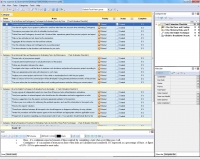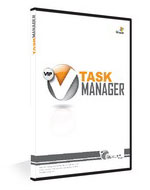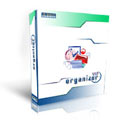|
Task Management Software |
 |
|
|
|
|
| |
|
 TESTIMONIALS TESTIMONIALS
|
|
"...This is an excellent program. I'm so glad that I stumbled on to this when researching for task management programs. Very low learning curv, quite flexible, and the price is right. Tried at least 20 other programs, either too complicated, too expensive, or poor documentation..."
Chad Lindsey -
Honolulu, HI
|
|
|
|
|
|
|
|
Task Estimation Checklist |
|
|
|
|
|
|

 |
Use this Task Estimation Checklist to read about popular methods for estimating tasks by time, performance, cost and quality. It will be helpful for project managers, estimators and planners when they plan for basic characteristics of tasks and define the total duration and budget for their projects.
|
| Order 750 checklists in MS Word and PDF printable format at $49.99 USD only. |
BUY NOW!  |
1. Use the Base and Contingency Technique for Estimating Tasks by Time.
- Consider two parameters for time estimates:
- Base – it’s a minimum expected amount of time required for completing a task when everything goes well.
- Contingency – it’s an amount of trust put on Base when risks are calculated and considered. It’s expressed as a percentage of Base. A figure of 10% -20% is quite normal to most tasks.
- Use the risk register of your project to define risks and then take them into account when estimating Contingency per task.
- Decompose your project into a list of estimable, low-level tasks.
- Define Base and Contingency for each task. Historical data, experience gained from previous projects and expert advice will be ways for estimating these parameters.
- Make a time estimate per task based on the parameters.
- Aggregate all the estimates into the total time estimate.
- Use this estimate to figure out Contingency for your entire project.
- Use time estimates to plan durations and timeframe for your tasks.
2. Use Historical Data and Experience for Estimating Tasks by Performance.
- Review tasks of your previous project.
- Compare planned performance to actual performance of the project.
- Define any deviations between the values.
- Investigate what steps could be taken to minimize such deviations and produce the previous project according to planned performance.
- Make an appropriate action plan with reference to such steps.
- Analyze your current project and find out if it has similar or standardized tasks with the past project.
- Make a forecast of how the current project will be developed if using planned performance metrics of the previous project.
- Use your action plan for minimizing deviations and avoiding performance reduction during your current project.
3. Use the Delphi Technique for Estimating Tasks by Quality.
- Assign a group of independent experts (no more than 20 persons) who will participate in estimations.
- Prepare lists of questions regarding your future project and its tasks. Your questions should include (but not be limited to) the following areas:
- Purpose of your project
- HR assigned to tasks
- Budget allocated to the overall project
- Cost per task
- Duration per task
- Performance criteria per task
- Quality standards for the project
- Send your questions to external experts who should review this information and make suggestions on what questions can be removed or improved.
- Receive suggestions from the experts and make appropriate updates to the questions.
- Produce your own solutions for addressing the updated questions and send this information to the experts who should independently investigate your solutions and propose their own solutions (if any).
- Receive the experts’ solutions.
- Share these solutions between all the experts who should approve or disapprove efficiency of every solution.
- Iterate this procedure until all the experts agree on the most efficient and appropriate solutions applicable to your project.
4. Build a Breakdown Structure for Estimating Tasks by Cost (the Three-Point Technique).
- Consider three figures for your cost estimates. These figures are:
- A – the best (optimistic) estimate
- B – the most likely estimate
- C – the worst (pessimistic) estimate
- Use the figures to calculate a weighted average (E) for every estimate and define a standard deviation (SD).
- Use the following formulas for calculating E and SD:
- E = A + 4 + B/6
- SD = (B - A)/6
- Decompose your project into a list of estimable tasks. For example, you can build a Work Breakdown Structure (WBS) with work packages.
- Calculate E for every cost estimate per task listed in WBS.
- Calculate SD for every cost estimate per task listed in WBS.
- Use both values (E and SD) to define Confidence Level (CF) for your estimates. Use this information:
- CL in E is approximately 50%
- CL in E + SD is approximately 70%
- CL in E + 2xSD is approximately 95%
- CL in E + 3xSD is approximately 99.5%
- Use only ...
| Order 750 checklists in MS Word and PDF printable format at $49.99 USD only. |
BUY NOW!  |
|





 |
CentriQS Tasks Management Solution 
Looking for multi-user task management software? Try CentriQS complete task management solution for planning, tracking and reporting tasks, projects, and schedules. Increase productivity of your small business or office by better organizing your employees' tasks and time.
 FREE Download CentriQS FREE Download CentriQS
|
|
|
|
|
|
|
|
|
|
CentriQS  -15% OFF -15% OFF |
All-in-one business management software
for small and midsize enterprises |
 |
|
|
| VIP Task Manager |
Multi-user project management software
to plan, schedule and track project tasks. |
 |
|
|
| VIP Checklists
|
More than 750 ready-to-use to-do lists
to plan your personal and business life |
 |
|
|
| VIP Team To Do List |
Professional task management software
to make and send team todo lists by email |
 |
|
|
| VIP Organizer |
Personal time management software
to organize time at home and at work |
 |
|
|
| VIP Simple To Do List
|
Simple and effective to-do list software
to plan daily chores, trips, wedding, etc. |
 |
|
|
|
|
|
|
|